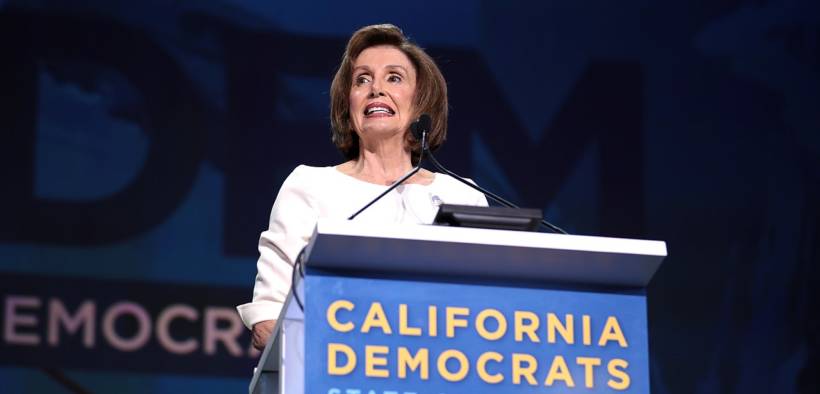Pelosi Unveils $3 Trillion Stimulus Package, but Faces Senate Pushback

The House is scheduled to vote on the $3 trillion economic relief bill Friday, but even if it passes, it faces challenges from the Republican-controlled Senate, according to POLITICO.
Speaker of the House Nancy Pelosi revealed the details of another stimulus package Tuesday. The House is scheduled to vote on the $3 trillion economic relief bill Friday, but even if it passes, it faces challenges from the Republican-controlled Senate, according to POLITICO.
Spending Everywhere
In its present form, the Health and Economic Recovery Omnibus Emergency Solutions (HEROES) Act includes $875 billion for state and local governments. Some governors were critical rounds of emergency funding for failing to provide for lower levels of government, which have seen sales tax revenue decline amid the pandemic.
Senate Majority Leader Mitch McConnell was initially opposed to funding states and said they should be allowed to go bankrupt. However, after Congress passed the most recent aid package, $450 billion for hospitals and small businesses, McConnell said a bailout for state and local governments would be discussed for the next stimulus. President Donald Trump also signaled he would be open to including them in a future spending package.
However, the Heroes Act includes more than that. It includes $25 billion for the US Postal Service, a business that Trump called “a joke.” Instead of emergency funding, the president proposed they raise prices.
“If they don’t raise the price, I’m not signing anything,” Trump said while signing the previous relief package. “So they’ll raise the price, so they become more profitable, but so they lose much less money. If they don’t do it, I’m not signing anything, and I’m not authorizing you to do anything, Steve [Mnuchin, treasury secretary].”
The Heroes Act also features another round of stimulus checks for Americans: $1,200 for adults and also for children. The Coronavirus Aid, Relief, and Economic Security (CARES) Act capped dependent children at $500.
The bill would also provide $3.6 billion for local governments to carryout the Nov. 3 election during the pandemic, $100 billion for hospitals in low-income communities, $75 billion for virus testing, $20 billion for tribal nations and territories, and $175 billion for a housing protection program, according to The Associated Press.
Additionally, the bill includes $375 billion for smaller municipalities that were overlooked by previous aid packages. It also allocates $200 billion of “hazard pay” for essential workers such as healthcare professionals. The Payroll Protection Program would receive another $10 billion and the $600-per-week addition to unemployment benefits would be extended until the end of January.
Wish List
McConnell called the HEROES Act a “big laundry list of pet priorities” and questioned its need.
“I don’t think we have yet felt the urgency of acting immediately,” McConnell said Monday, before Pelosi revealed the contents of the bill. “We now have a debt the size of our economy. So I’ve said, and the president has said as well, that we have to take a pause here and take a look at what we’ve done.”
While some Democrats have conceded the HEROES Act is designed to get Congress talking about the next relief bill, even if they don’t agree to the current proposal, Pelosi believes the time is now for more aid.
“To those who would suggest a pause, I’ll say the hunger doesn’t take a pause. The rent doesn’t take a pause. The hardship doesn’t take a pause,” Pelosi said on an MSNBC interview Monday evening.
The speaker said the price tag of he HEROES Act was initially $4 trillion before provisions were trimmed out of it. Within the 1,800 pages, Democrats have included several measures they have pushed for since before the pandemic struck. These include the reintroduction of state and local tax deductions, which were removed in a 2017 tax bill, POLITICO reported.
Tucked between the pages is also a provision to enable cannabis companies to have easier access to bank accounts and business loans.
Up to Trump
The Senate recesses at the end of next week and won’t return until June 1, making it unlikely that it will vote on the HEROES Act until next month. For Senate Republicans to consider any additional relief, McConnell and Trump are likely to demand liability protections for medical providers and companies that choose to reopen. Shielding companies from liability, particularly from workers, has already been a point of contention between the two parties, The New York Times reported.
“I don’t think that at this time, with coronavirus, that there’s any interest in having any less protection for our workers,” Pelosi said in April.
Unions have also pushed back on the idea of absolving businesses from legal responsibility for COVID-19 infections.
“This is a discussion from corporations and employers that are shirking their employees on the front lines of the pandemic,” said Mary Kay Henry, president of the Service Employees International Union. “They’re now going to try, as they infect people, to shirk any legal responsibility for it?”
The HEROES Act provides a baseline for discussions of future relief acts. Although Democrats are clear with their desires, McConnell and the GOP-led Senate are coordinating directly with the White House. If a bill doesn’t receive Trump’s seal of approval, Republican legislators will waste no time in declaring it dead on arrival in the Senate.
A hefty price tag, no liability protections for businesses, and funding for the postal service have already been established as partisan issues. If the House passes the HEROS Act on Friday, the Senate will have to decide whether to dismiss the bill entirely or try to meet the other side halfway. That calculation could be determined by Trump who was scheduled to meet with senators on Tuesday.















